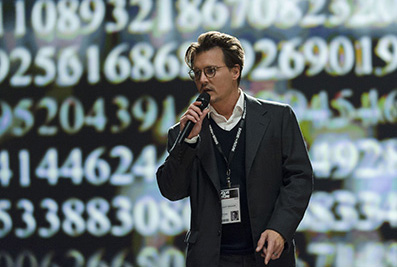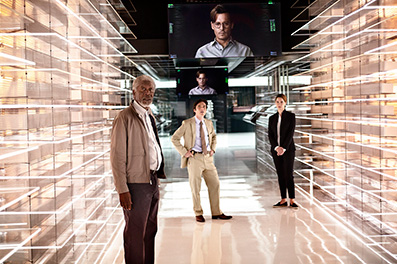"I wanted to get away from the clichéd notion of a sentient machine
taking over the world. There are deeper questions of what we're using
technology for. To heal or to create a barrier? Is it benevolent or
malevolent? I want the audience to understand both sides of it." |
Director, Wall Pfister, interviewed for the L.A. Times |
I know nothing. I'm certain about that. I have opinions based on the accumulation of knowledge and experience but when it comes to actually knowing anything, I'm just like everyone else; dependent on an opinion, a sometimes rash but potent soufflé of ideas and prejudices processed into the written word via some very dodgy sources of 'truth'. I liked and admired Transcendence but were it not for my son's engaging argument in support of why he particularly enjoyed it, I wouldn't be reviewing it because I didn't emotionally engage with the movie or its characters. I'm sure lots of other people will. Stating that I know nothing is my only way of underlining this review as a very personal response because there are many things to be gained from going to see this piece of work, which is very unblockbustery as Hollywood movies go. It's somewhat European in tone, slower paced and more contemplative. I just didn't connect with it (I really wanted to, can you tell?) but its themes are huge and worth taking some time to mull over. The actual narrative never seemed to gel and there were no revelations or surprises that excited save one literal shock near the start. The ending was confusing (more on that later) and I also found a few thumping clichés too difficult to comfortably push past. But the central idea, the springboard and catalyst of the argument about what constitutes 'consciousness' – well, that's too tempting an idea not to throw down a few words about the movie.

In movie cliché, a sentient machine is generally an evil one. No question. There are a few benevolent digital creations in science fiction. I can think of Eddie the shipboard computer from the starship Heart Of Gold in Douglas Adams' Hitchhiker's Guide to the Galaxy – and he was an annoying tosspot. There is also Iron Man's Paul Bettany (the voice of Stark's bespoke operating system) who curiously stars in Transcendence with Johnny Depp, Morgan Freeman and Rebecca Hall. There are tons of examples of digital dastardliness but the ones that spring to mind ungoogled are Demon Seed with a human-machine offspring ending that all but destroyed the fragile reality of a Robert Vaughn voiced machine mating with Julie Christie; "I'm alive!" indeed. There's 2001's HAL of course who saw his unique appraisal of first contact with extraterrestrial life as so much more important than human life and paid a high, mind-losing price for his actions. Skynet in James Cameron's Terminator series is a pretty nasty customer. I could go on. The Matrix. There, I just did. I'll stop now. Director Pfister had to deal with the deeply imbedded conception of an all too easily accepted evil intelligence in amongst the bytes of the flash and chips. He sort of second guessed his audience by making Johnny Depp's digital doppelgänger a clearly scary, semi-omniscient data cruncher and then played with those conceptions to varying degrees of success. And by that I also mean varying degrees of failure as far as I'm concerned. The question of the moral or immoral intentions of the computerised Professor Caster was central to the movie despite many disconnected themes and ideas offered that simply didn't have enough emotional punch behind them from my perspective. It felt like being shown a photograph of a sumptuous meal instead of letting us taste it.
Johnny Depp is Will Caster, an artificial intelligence whizz (we know this because he's on the cover of Wired magazine. This is fast becoming a cliché all of its own). He has a smart, adoring and ambitious, wannabe world saving wife, Evelyn, played by Rebecca Hall, a best friend and fellow whizz, Max, the afore mentioned Paul Bettany. Depp is close to creating a truly artificially intelligent computer but is shot and fatally poisoned before he can introduce his creation to the wider world. He's a victim of a terrorist group whose members are well aware of what might happen if an A.I. computer extends itself to the Internet. It's refreshing to see a terrorist organisation over the course of the movie actually become freedom fighters. A coordinated attack brings down a number of fellow scientists working towards the same aim leaving Depp a survivor but with only weeks to live because of radiation sickness. His wife and Max work feverishly to blend Depp's consciousness with his own A.I. computer. Do you think they're successful? That's the key to the whole movie. Is it really Will inhabiting the mainframe, an amalgam of Will and the A.I. or the A.I. posing as Will to gain power and control? Pfister leads us down the garden path well trod by many science fiction authors and filmmakers. Will devotes (itself?) himself to creating an independent power source and a small army of once stricken, now healed locals who are super strong and single members of a hive mind as long as they are in contact with Will's central computer. Remember, we're talking about an A.I. with the collective knowledge of the entire human race via the Internet. Even if he just had access to Facebook he'd be powerful enough.

Pfister teases us with this lust for power and in some ways, he didn't push it far enough. The sum of human knowledge – that's a fair-sized playground and we're in the desert for years... To keep the movie visually interesting, the physical extension of Will's power is illustrated by miniature self-replicating robots, nanobots, grey clouds of tech that heal, disable and correct. Just FYI, in reality, this technology is in the research and development phase. The only aspect of their design that had me scratching my head was their ability to fly. My son tried to convince me it was just the air currents' effect because they were so light. Uh, OK. There are explosions (are explosions contractual these days?) as the 'terrorists' attack Will's complex with absurdly old fashioned cannons (what was the thinking behind that?) but both the bots and bangs seem like sops to the big budget template when it's the ideas that are Transcendence's trump cards not its attempt to give audiences what it's perceived they want. And what about the framing structure, the opening that essentially tells us everything went very badly and the movie you are about to watch is somewhat diluted by the fact that the ending is given away by implication at the very start. Shouldn't there be a narrative law against that? Thou shalt not start The Sting with Newman and Redford in a joke shop buying fake blood capsules... I had issues with the opening but the ending actually irked me.
The final scene of Transcendence is a curious beast (no spoilers). One of the characters returns to a familiar spot and notices a few things, things foreshadowed by a visually diverse series of opening shots. I left the cinema asking specific questions about this ending and subsequently learned from Wikipedia what actually happened, especially in the last shot. Now knowing what actually was supposed to have happened, I'm sure the next time I see it, it will be clear but I offer two things to consider on this perception or lack thereof on my part; first, in the very entertaining 'how to' manual What They Don't Teach You At Film School is one piece of advice I adhere to making my own films. It states, "Sacrifice everything for clarity." Now, this doesn't mean that you cannot be impenetrable or dense or deliberately ambiguous and confusing... But if you are meaning to be these things then make sure you're being clear that this is what you're doing. Secondly there is an extraordinary pair of lines in Elton John's Goodbye Yellow Brick Road. Stay with me. They are; "Back to the howling old owl in the woods, hunting the horny back toad..." As a child without instant access to information unaided by Elton John's faux American drawl, I interpreted these lines something like this... "back to ow-ning knoll l'ow nina woos... Hun-en th-thorry buck doooooow..." My point is that once the real lyric was revealed to me, I could no longer remember my initial vowel-inspired rendition of it. What I've just written would be a fair approximation of it. It's the same with this movie's final shot. Now I know what it was supposed to be, it's obvious. But it wasn't obvious to me yesterday. I left the cinema somewhat frustrated – never good. But to inspire conversations, Transcendence will offer up a smorgasbord of topics and arguments. Just don't go expecting a full-blown action blockbuster. |